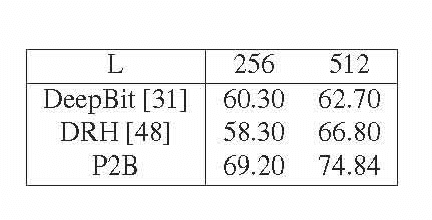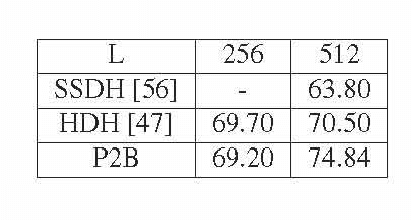Khoa Le
Simultaneous Feature Aggregating and Hashing for Compact Binary Code Learning
Apr 24, 2019



Abstract:Representing images by compact hash codes is an attractive approach for large-scale content-based image retrieval. In most state-of-the-art hashing-based image retrieval systems, for each image, local descriptors are first aggregated as a global representation vector. This global vector is then subjected to a hashing function to generate a binary hash code. In previous works, the aggregating and the hashing processes are designed independently. Hence these frameworks may generate suboptimal hash codes. In this paper, we first propose a novel unsupervised hashing framework in which feature aggregating and hashing are designed simultaneously and optimized jointly. Specifically, our joint optimization generates aggregated representations that can be better reconstructed by some binary codes. This leads to more discriminative binary hash codes and improved retrieval accuracy. In addition, the proposed method is flexible. It can be extended for supervised hashing. When the data label is available, the framework can be adapted to learn binary codes which minimize the reconstruction loss w.r.t. label vectors. Furthermore, we also propose a fast version of the state-of-the-art hashing method Binary Autoencoder to be used in our proposed frameworks. Extensive experiments on benchmark datasets under various settings show that the proposed methods outperform state-of-the-art unsupervised and supervised hashing methods.
Binary Constrained Deep Hashing Network for Image Retrieval without Manual Annotation
Aug 02, 2018



Abstract:Learning compact binary codes for image retrieval problem using deep neural networks has attracted increasing attention recently. However, training deep hashing networks is challenging due to the binary constraints on the hash codes, the similarity preserving property, and the requirement for a vast amount of labelled images. To the best of our knowledge, none of the existing methods has tackled all of these challenges completely in a unified framework. In this work, we propose a novel end-to-end deep hashing approach, which is trained to produce binary codes directly from image pixels without the need of manual annotation. In particular, we propose a novel pairwise binary constrained loss function, which simultaneously encodes the distances between pairs of hash codes, and the binary quantization error. In order to train the network with the proposed loss function, we also propose an efficient parameter learning algorithm. In addition, to provide similar/dissimilar training images to train the network, we exploit 3D models reconstructed from unlabelled images for automatic generation of enormous similar/dissimilar pairs. Extensive experiments on three image retrieval benchmark datasets demonstrate the superior performance of the proposed method over the state-of-the-art hashing methods on the image retrieval problem.
 Add to Chrome
Add to Chrome Add to Firefox
Add to Firefox Add to Edge
Add to Edge